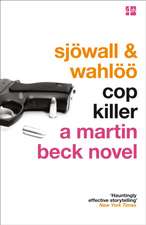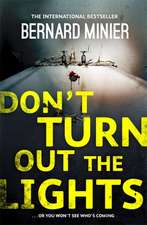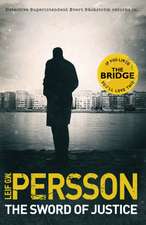The Man on the Balcony: A Martin Beck Novel
Autor Maj Sjowall, Per Wahlooen Limba Engleză Paperback – 23 iun 2011
| Toate formatele și edițiile | Preț | Express |
|---|---|---|
| Paperback (2) | 63.09 lei 3-5 săpt. | +7.57 lei 7-13 zile |
| HarperCollins Publishers – 23 iun 2011 | 63.09 lei 3-5 săpt. | +7.57 lei 7-13 zile |
| Vintage Crime/Black Lizard – 31 ian 2009 | 100.57 lei 3-5 săpt. |
Preț: 63.09 lei
Nou
Puncte Express: 95
Preț estimativ în valută:
12.07€ • 12.56$ • 9.97£
12.07€ • 12.56$ • 9.97£
Carte disponibilă
Livrare economică 22 martie-05 aprilie
Livrare express 08-14 martie pentru 17.56 lei
Preluare comenzi: 021 569.72.76
Specificații
ISBN-13: 9780007439133
ISBN-10: 000743913X
Pagini: 288
Dimensiuni: 128 x 198 x 20 mm
Greutate: 0.18 kg
Editura: HarperCollins Publishers
Seria A Martin Beck Novel
ISBN-10: 000743913X
Pagini: 288
Dimensiuni: 128 x 198 x 20 mm
Greutate: 0.18 kg
Editura: HarperCollins Publishers
Seria A Martin Beck Novel
Notă biografică
Maj Sjöwall and Per Wahlöö, her husband and coauthor, wrote ten Martin Beck mysteries. Mr Wahlöö, who died in 1975, was a reporter for several Swedish newspapers and magazines and wrote numerous radio and television plays, film scripts, short stories, and novels. Maj Sjöwall is also a poet.
Extras
1At a quarter to three the sun rose.An hour and a half earlier the traffic had thinned out and died away, together with the noise of the last night revelers on their way home. The street-sweeping machines had passed, leaving dark wet strips here and there on the asphalt. An ambulance had wailed down the long, straight street. A black car with white mudguards, radio antenna on the roof and the word POLICE in white block letters on the sides had glided past, silently and slowly. Five minutes later the tinkle of broken glass had been heard as someone drove a gloved hand through a shop window; then came the sound of running footsteps and a car tearing off down a sidestreet.The man on the balcony had observed all this. The balcony was the ordinary kind with tubular iron rail and sides of corrugated metal. He had stood leaning on the rail, and the glow of his cigarette had been a tiny dark-red spot in the dark. At regular intervals he had stubbed out a cigarette, carefully picked the butt--barely a third of an inch long--out of the wooden holder and placed it beside the others. Ten of these butts were already neatly lined up along the edge of the saucer on the little garden table.It was quiet now, as quiet as it could be on a mild early summer's night in a big city. A couple of hours still remained before the women who delivered the newspapers appeared, pushing their converted prams, and before the first office cleaner went to work.The bleak half-light of dawn was dispersed slowly; the first hesitant sunbeams groped over the five-storied and six-storied apartment houses and were reflected in the television aerials and the round chimney pots above the roofs on the other side of the street. Then the light fell on the metal roofs themselves, slid quickly down and crept over the eaves along plastered brick walls with rows of unseeing windows, most of which were screened by drawn curtains or lowered Venetian blinds.The man on the balcony leaned over and looked down the street. It ran from north to south and was long and straight; he could survey a stretch of more than two thousand yards. Once it had been an avenue, a showplace and the pride of the city, but forty years had passed since it was built. The street was almost exactly the same age as the man on the balcony.When he strained his eyes he could make out a lone figure in the far distance. Perhaps a policeman. For the first time in several hours he went into the apartment; he passed through the living room and out into the kitchen. It was broad daylight now and he had no need to switch on the electric light; in fact he used it very sparingly even in the winter. Opening a cupboard, he took out an enamel coffeepot, then measured one and a half cups of water and two spoonfuls of coarse-ground coffee. He put the pot on the stove, struck a match and lit the gas. Felt the match with his fingertips to make sure it had gone out, then opened the door of the cupboard under the sink and threw the dead match into the garbage bag. He stood at the stove until the coffee had boiled up, then turned the gas off and went out to the bathroom and urinated while waiting for the grounds to sink. He avoided flushing the toilet so as not to disturb the neighbors. Went back to the kitchen, poured the coffee carefully into the cup, took a lump of sugar from the half-empty packet on the sink and a spoon out of the drawer. Then he carried the cup to the balcony, put it on the varnished wooden table and sat down on the folding chair. The sun had already climbed fairly high and lit up the front of the buildings on the other side of the street down as far as the two lowest apartments. Taking a nickel-plated snuffbox from his trouser pocket, he crumbled the cigarette butts one by one, letting the tobacco flakes run through his fingers down into the round metal box and crumpling the bits of paper into pea-sized balls which he placed on the chipped saucer. He stirred the coffee and drank it very slowly. The sirens sounded again, far away. He stood up and watched the ambulance as the howl grew louder and louder and then subsided. A minute later the ambulance was nothing but a small white rectangle which turned left at the north end of the street and vanished from sight. Sitting down again on the folding chair he abstractedly stirred the coffee, which was now cold. He sat quite still, listening to the city wake up around him, at first reluctantly and undecidedly.The man on the balcony was of average height and normal build. His face was nondescript and he was dressed in a white shirt with no tie, unpressed brown gabardine trousers, gray socks and black shoes. His hair was thin and brushed straight back, he had a big nose and gray-blue eyes.The time was half past six on the morning of June 2, 1967. The city was Stockholm.The man on the balcony had no feeling of being observed. He had no particular feeling of anything. He thought he would make some oatmeal a little later.The street was coming alive. The stream of motor vehicles was denser and every time the traffic lights at the intersection changed to red the line of waiting cars grew longer. A baker's van tooted angrily at a cyclist who swung out heedlessly into the road. Two cars behind braked with a screech.The man got up, leaned his arms on the balcony rail and looked down into the street. The cyclist wobbled anxiously in towards the sidewalk, pretending not to hear the abuse slung at him by the delivery man.On the sidewalks a few pedestrians hurried along. Two women in light summer dresses stood talking by the gasoline station below the balcony, and farther away a man was exercising his dog. He jerked impatiently at the lead while the dachshund unconcernedly sniffed around the trunk of a tree.The man on the balcony straightened up, smoothed his thinning hair and put his hands in his pockets. The time now was twenty to eight and the sun was high. He looked up at the sky where a jet plane was drawing a trail of white wool in the blue. Then he lowered his eyes once more to the street and watched an elderly white-haired woman in a pale-blue coat who was standing outside the baker's in the building opposite. She fumbled for a long time in her handbag before getting out a key and unlocking the door. He saw her take out the key, put it in the lock on the inside and then shut the door after her. Drawn down behind the pane of the door was a white blind with the word CLOSED.At the same moment the apartment-house entrance door next to the baker's opened and a little girl came out into the sunshine. The man on the balcony moved back a step, took his hands out of his pockets and stood quite still. His eyes were glued to the girl down in the street.She looked about eight or nine and was carrying a red-checked satchel. She was wearing a short blue skirt, a striped T-shirt and a red jacket with sleeves that were too short. On her feet she had black wooden-soled sandals that made her long thin legs seem even longer and thinner. She turned to the left outside the door and started walking slowly along the street with lowered head.The man on the balcony followed her with his eyes. When she had gone about twenty yards she stopped, raised her hand to her breast and stood like that for a moment. Then she opened the satchel and rummaged in it while she turned and began to walk back. Then she broke into a run and rushed back inside without closing the satchel.The man on the balcony stood quite still and watched the entrance door close behind her. Some minutes passed before it opened again and the girl came out. She had closed the satchel now and walked more quickly. Her fair hair was tied in a pony tail and swung against her back. When she got to the end of the block she turned the corner and disappeared.The time was three minutes to eight. The man turned around, went inside and into the kitchen. There he drank a glass of water, rinsed the glass, put it on the rack and went out again onto the balcony.He sat down on the folding chair and laid his left arm on the rail. He lighted a cigarette and looked down into the street while he smoked.2The time by the electric wall-clock was five minutes to eleven and the date, according to the calendar on Gunvald Larsson's desk, was Friday, June 2, 1967.Martin Beck was only in the room by chance. He had just come in and put down his case on the floor inside the door. He had said hello, laid his hat beside the carafe on the filing cabinet, taken a glass from the tray and filled it with water, leaned against the cabinet and was about to drink. The man behind the desk looked at him ill-humoredly and said: "Have they sent you here too? What have we done wrong now?"Martin Beck took a sip of water."Nothing, as far as I know. And don't worry. I only came up to see Melander. I asked him to do something for me. Where is he?""In the lavatory as usual."Melander's curious capacity for always being in the lavatory was a hackneyed joke, and although there was a grain of truth in it Martin Beck for some reason felt irritated.Mostly, however, he kept his irritation to himself. He gave the man at the desk a calm, searching look and said:"What's bothering you?""What do you think? The muggings of course. There was one in Vanadis Park last night again."So I heard.""A pensioner who was out with his dog. Struck on the head from behind. A hundred and forty kronor in his wallet. Concussion. Still in hospital. Heard nothing. Saw nothing."Martin Beck was silent."This was the eighth time in two weeks. That guy will end by killing someone."Martin Beck drained the glass and put it down."If someone doesn't grab him soon," Gunvald Larsson said."Who do you mean by someone?""The police, for Christ's sake. Us. Anybody. A civil patrol from the protection squad in ninth district was there ten minutes before it happened.""And when it happened? Where were they then?""Sitting over coffee at the station. It's the same all the time. If there's a policeman hiding in every bush in Vanadis Park, then it happens in Vasa Park, and if there's a policeman hiding in every bush in both Vanadis Park and Vasa Park, then he pops up in Lill-Jans Wood.""And if there's a policeman in every bush there too?""Then the demonstrators break up the US Trade Center and set fire to the American embassy. This is no joking matter," Gunvald Larsson added stiffly.Keeping his eyes fixed on him, Martin Beck said:"I'm not joking. I just wondered.""This man knows his business. It's almost as if he had radar. There's never a policeman in sight when he attacks."Martin Beck rubbed the bridge of his nose between thumb and forefinger."Send out..."Larsson broke in at once."Send out? Whom? What? The dog van? And let those goddam dogs tear the civil patrol to pieces? Yesterday's victim had a dog, come to that. What good was it to him?""What kind of dog?""How the hell do 1 know? Shall I interrogate the dog perhaps? Shall I get the dog here and send it out to the lavatory so that Melander can interrogate it?"Gunvald Larsson said this with great gravity. He pounded the desk with his fist and went on:"A lunatic prowls about the parks bashing people on the head and you come here and start talking about dogs!""Actually it wasn't I who..."Again Gunvald Larsson interrupted him."Anyway, I told you, this man knows his business. He only goes for defenseless old men and women. And always from behind. What was it someone said last week? Oh yes, 'he leaped out of the bushes like a panther."'"There's only one way," Martin Beck said in a honeyed voice."What's that?""You'd better go out yourself. Disguised as a defenseless old man."The man at the desk turned his head and glared at him.Gunvald Larsson was six foot three and weighed 216 pounds. He had shoulders like a heavyweight boxer and huge hands covered with shaggy blond hair. He had fair hair, brushed straight back, and discontented, clear blue eyes. Kollberg usually completed the description by saying that the expression on his face was that of a motorcyclist.Just now the blue eyes were looking at Martin Beck with more than the usual disapproval.Martin Beck shrugged and said:"Joking apart..."And Gunvald Larsson interrupted him at once."Joking apart I can't see anything funny in this. Here am I up to my neck in one of the worst cases of robbery I've ever known, and along you come driveling about dogs and God knows what."Martin Beck realized that the other man, no doubt unintentionally, was about to do something that only few succeeded in: to annoy him to the point of making him lose his temper. And although he was quite well aware of this, he could not help raising his arm from the cabinet and saying:"That's enough!"At that moment, fortunately, Melander came in from the room next door. He was in his shirtsleeves, and had a pipe in his mouth and an open telephone directory in his hands."Hello," he said."Hello," said Martin Beck."I thought of the name the second you hung up," Melander said. "Arvid Larsson. Found him in the telephone directory too. But it's no good calling him. He died in April. Stroke. But he was in the same line of business up to the last. Had a rag-and-bone shop on the south side. It's shut now."Martin Beck took the directory, looked at it and nodded. Melander dug a matchbox out of his trouser pocket and began elaborately lighting his pipe. Martin Beck took two steps into the room and put the directory down on the table. Then he went back to the filing cabinet."What are you busy on, you two?" Gunvald Larsson asked suspiciously.
Recenzii
“The first great series of police thrillers. . . . Truly exciting.”—Michael Ondaatje"Hauntingly effective storytelling."—The New York Times Book Review“Sjöwall and Wahlöö write unsparingly and unswervingly. . . . Their plots are second to none.”—Val McDermid“It's hard to think of any other thriller writers (apart from Simenon perhaps) who can capture so much of a society in a couple of hundred pages and yet still hold true to the thriller form.”—Sean and Nicci French


















